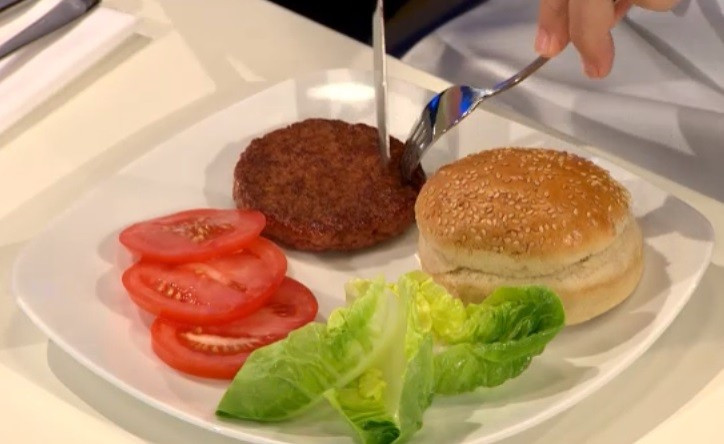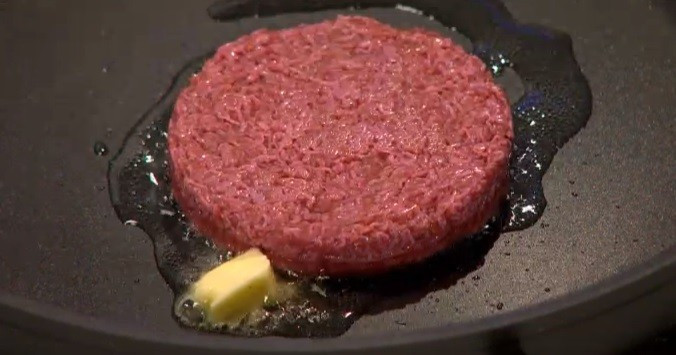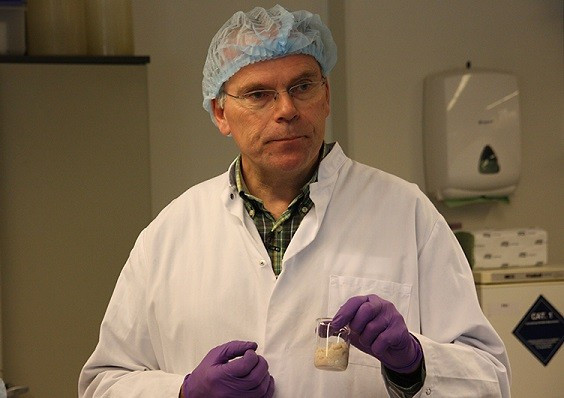Soylent Brin: Google Chief Cooks-up Stem Cell Burger Grown in Lab [PHOTOS]

The world's first burger created entirely in a laboratory using stem cells has been unveiled at a news conference.
The 5oz patty, believed to have cost around £220,000, was cooked and eaten in front of a specially invited audience at a secret event in London
Professor Mark Post, a medical physiologist at Maastricht University, spent five years creating the burger, which he believes will be sold in supermarkets within the next 10 years.
Creating the synthetic meat could reduce the environmental footprint of farmed cattle by as much as 60%, as well as being a solution to cut down on expected food shortage as the world's population is predicted to rise to 9.5 billion within the next 50 years.
The burger was created by growing bovine stem cells in a vat, turning them into tens of thousands of thin strips of beef muscle cells and painstakingly mixing them together. Red beetroot juice and saffron were added to provide authentic beef colouring.
Post said: "What we are going to attempt is important because I hope it will show cultured beef has the answers to major problems that the world faces.
"Our burger is made from muscle cells taken from a cow. We haven't altered them in any way. For it to succeed it has to look, feel and hopefully taste like the real thing."

At the special tasting event in a secret location in London, the burger was sampled by Chicago author Josh Schonwald and Austrian food researcher Hanni Rützler.
It was cooked by Cornwall chef Richard McGeown, who told the audience he would cook the £220,000 specimen the same way he would do any other type of burger.
Rützler described the consistency as "perfect" and "close to meat", but added there was a distinct difference in taste between a natural burger and the manufactured variety.
She added: "I was expecting the texture to be more soft... there is quite some intense taste, it's close to meat, but it's not that juicy. The consistency is perfect, but I miss salt and pepper."
Schonwald said: "The mouth-feel is like meat. I miss the fat, there's a leanness to it, but the general bite feels like a hamburger.
"What was consistently different was flavour."
After sampling the burger he spent hundreds of thousands of pounds to create, Post remarked: "It's a very good start".
The experiment got the go-ahead with a £215,000 donation from an anonymous source, who was unveiled to be co-founder of Google, Sergey Brin.
Brin, who set up Google with university colleague Larry Page, is one of the wealthiest people in the world and has previously invested in the spaceflight company Space Adventure, offering trips to the moon for around £65m ($100m)
"It's really just proof of concept right now, we're trying to create the first cultured beef hamburger," said Brin in a film to mark the meat's unveiling. "'Sometimes a new technology comes along and it has the capability to transform how we view the world."

One group who welcomed the burger was the animal welfare organisation Peta.
A spokesperson said: "Today, putting meat on the table causes enormous suffering to animals and environmental damage, yet one day you will be able to eat meat with ethical impunity. In vitro technology will spell the end of lorries full of cows and chickens, abattoirs and factory farming.
"It will reduce carbon emissions, conserve water and make the food supply safer. Of course, fantastic, tasty mock meats exist already in the form of fakin' bacon, meat-free chicken patties, mock lobster and various veggie burgers - from nuts and soya to beans and grain - which offer the taste of meat without a scintilla of the cholesterol or cruelty.
"But lab-grown meat will provide people who were addicted from childhood to the saturated fat in flesh with the "methadone" for their habit."
Science Fiction Nightmare?
How to feed an ever expanding planet has proved fertile territory for artists and thinkers since the early seventies. The 1973 movie Soylent Green, a nightmarish science fiction vision of an over-populated world, based on the novel by Harry Harrison, and starring Charlton Heston.
Food is in short supply, and most of the population's food source comes from synthetics manufactured in local factories -- the dinner selections being a choice between Soylent Red, Soylent Yellow, or Soylent Green.
When a top executive in the Soylent Company, is found murdered, police detective Thorn (Charlton Heston) is sent in to investigate the case. Helping him out researching the case is Thorn's old friend Sol Roth (Edward G. Robinson, in his final film role). As they investigate the environs of a succession of mad-from-hunger New Yorkers and the luxuriously rich digs of the lucky few, Thorn uncovers the terrible truth about the real ingredients of Soylent Green - human flesh converted into protein.
© Copyright IBTimes 2025. All rights reserved.




















